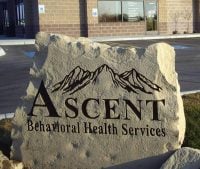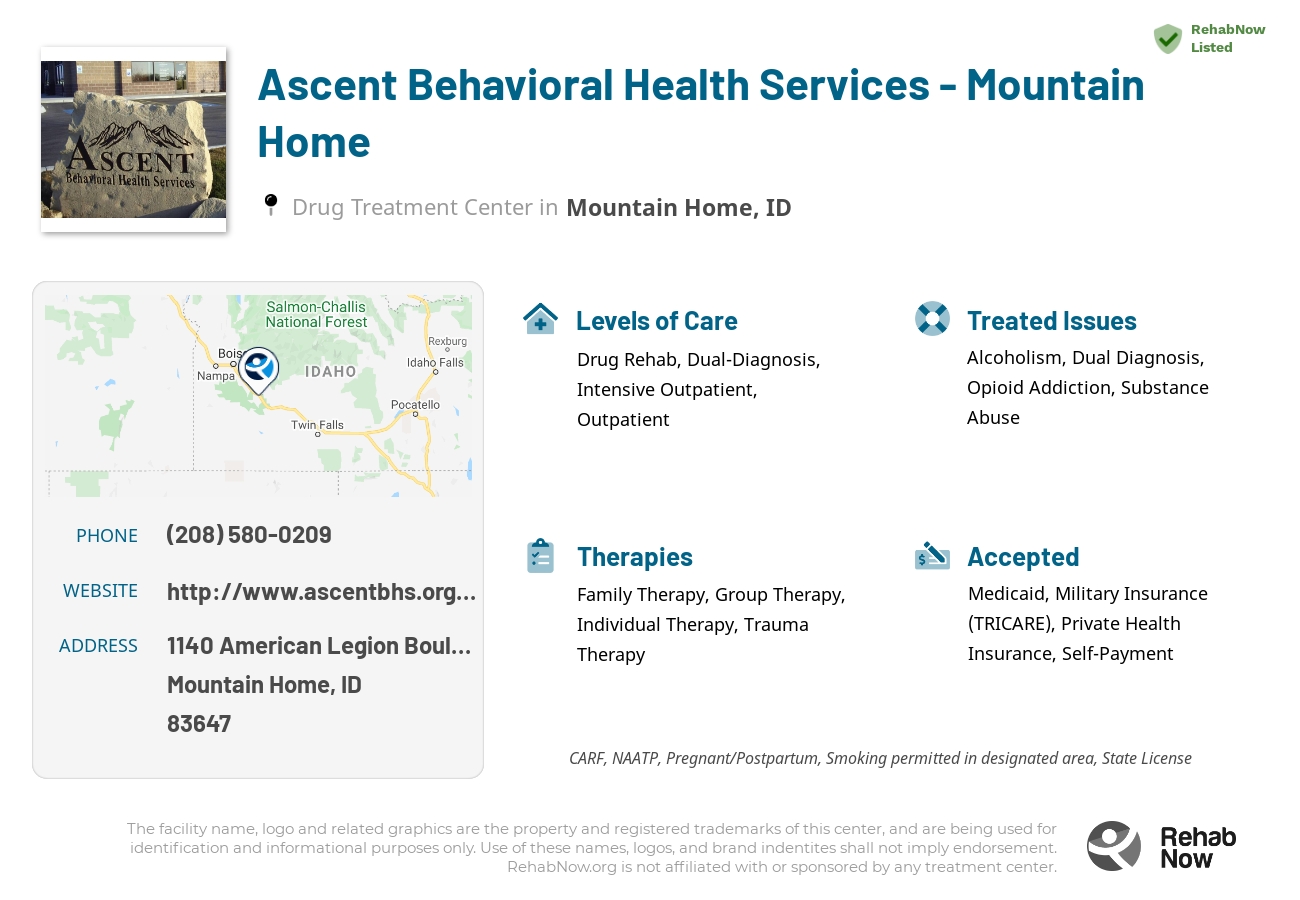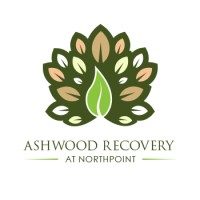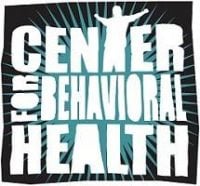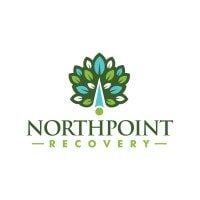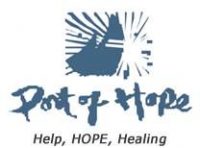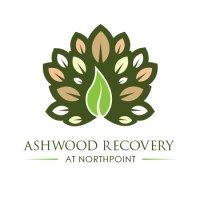Ascent Behavioral Health Services - Mountain Home
Drug Rehab Center in Mountain Home, Idaho
Ascent Behavioral Health Services - Mountain Home provides mental health and addiction treatment services with multidisciplinary and evidence-based care, specializing in treating addictions and substance abuse through a variety of services, and offering innovative programs such as yoga, art therapy, and music therapy as well as group therapy, nutrition education, and family counseling.
Multiple patients have reported Ascent Behavioral Health Services - Mountain Home as permanently closed.
Research other rehabs in Mountain Home, Idaho, or get help finding an open facility.
About Ascent Behavioral Health Services - Mountain Home in Idaho
Ascent Behavioral Health Services - Mountain Home is a premier recovery center offering mental health and addiction treatment services to individuals in Mountain Home, Idaho and its surrounding areas. It’s a full continuum facility serving adults, adolescents, and families with a variety of mental health issues, including mood disorders, substance use disorders, and severe mental illnesses. Ascent Behavioral Health Services - Mountain Home staff provide multidisciplinary and evidence-based care, utilizing cognitive-behavioral therapy, dialectical behavior therapy, 12-Step facilitation, motivational interviewing, and several other treatment approaches to help their clients achieve recovery.
At Ascent Behavioral Health Services - Mountain Home, staffs specialize in treating addictions and substance abuse through a variety of services. With an experienced and compassionate team of psychiatrists, psychologists, therapists, and nurses, they offer comprehensive substance abuse assessments and individualized treatment plans. Staffs provide a range of professionally-led therapies including cognitive-behavioral therapy, dialectical behavior therapy, and motivational interviewing, as well as evidence-based pharmacotherapy and relapse prevention strategies.
Ascent Behavioral Health Services - Mountain Home is accredited by the Joint Commission, a nationally recognized agency that accredits and certifies more than 19,000 health care organizations and programs in the U.S. Additionally, they have received awards from the Idaho Council on Child Abuse Prevention, recognizing their staff and the dedication to providing quality services. Ascent Behavioral Health Services - Mountain Home also offers innovative programs such as yoga, art therapy, and music therapy as well as group therapy, nutrition education, and family counseling.
Genders
Ages
Modality
Additional
Conditions and Issues Treated
Substance abuse creates problems that affect people in Mountain Home, ID on many levels. First, substance abuse affects the individual who is abusing drugs or alcohol. This can result in health problems, including heart damage and overdose. Substance abuse also affects the user’s family, friends, co-workers, classmates, or peers. These people feel frustrated because they do not know how to help their loved ones struggling with addiction. At the same time, the addict cannot control his behavior. Lastly, friends and family members of addicts are affected financially by substance abuse.
The good news is that effective treatments can help prevent substance abuse or treat its effects on the user. These treatments, which include behavioral therapy and counseling sessions, target the underlying causes of substance abuse, helping users achieve sobriety so they can regain control over their lives. They also teach users to cope with stress in ways other than using drugs or alcohol.
Opioid addiction has become a significant health problem in the United States. When a person’s life becomes unmanageable because of an opioid addiction, treatment can help them get sober. Treatment includes medical care and counseling.
“With so many people struggling with opioid addiction, we need more care and attention for those who want to quit. Opioid addicts often take opioids when they experience a painful injury – that’s how the cycle starts! When someone begins taking their medication differently than prescribed or takes an excessive amount of drugs, it means they’re hooked on drugs and in danger of overdosing.
The most successful way to beat this is through detoxing from these types treatments at Ascent Behavioral Health Services - Mountain Home in . Most facilities start by using medical support during the process while providing counseling services; rehabilitation comes later on after treatment has been completed successfully.
A “dual diagnosis” is when the individual has two medical issues at the same time. The top co-occurring mental disorders with addiction are depression, anxiety, ADHD, bi-polar disorder. Addiction is also considered a mental illness that is not a choice but rather a medical condition. Addiction can be caused by any number of underlying issues.
Dual diagnosis is provided by Ascent Behavioral Health Services - Mountain Home to treat addictive tendencies as well as any untreated mental illnesses. This ensures successful long term health and recovery for patients after treatment has been completed.
Dual diagnosis is provided by Ascent Behavioral Health Services - Mountain Home to treat addictive tendencies as well as any untreated mental illnesses for people in Idaho. This ensures successful long term health and recovery for patients after treatment has been completed.Levels of Care Offered
This center offers a variety of custom treatment tailored to individual recovery. Currently available are Drug Rehab, Dual-Diagnosis, Intensive Outpatient, Outpatient, with additional therapies available as listed below.
Outpatient addiction treatment is beneficial for people who are able to function well in their day-to-day lives. It is recommended for people who are not yet ready to end their relationships with friends or family members who might be encouraging drug and alcohol use.
Intensive outpatient treatment is beneficial for:
- People who are able to attend treatment more than 3 times per week.
- People who do not meet the criteria for inpatient treatment.
- People who are able to contribute to their own recovery outside of the treatment center.
- People who are motivated towards recovery.
- People who are able to overcome addiction on their own without the need for higher levels of care.
Outpatient programs at Ascent Behavioral Health Services - Mountain Home, the Mountain Home resident can live with their family while continuing with their job or studies. Treatment includes educating the patient on drug abuse, medications, and counseling sessions at the individual or group level. Outpatient treatment plans cover diagnosis, detoxification, management, and counseling. They are a popular option for those who have graduated from inpatient facilities.
Therapies & Programs
Individual therapy is a form of counseling where you meet with a trained professional one-on-one. Meeting with a therapist in this setting allows for a personal and trusting relationship to be built. This allows the patient to open up about sensitive or private issues they may not feel comfortable discussing in a group. Individual therapy helps identify the root causes of your addiction, which can help prevent relapse.
Family therapy is often done alongside drug treatment to help addicts stay sober. The goal of family therapy for drug addiction is to create an environment where communication can happen without judgment, hostility, or blame. The therapist will sit with the family so they can learn how to communicate differently and provide new tools for dealing with emotions so that people don’t want to drink or do drugs. It’s important for families to focus on relapse prevention plans during treatment so that if the addict feels like they want to use again, they’ll know what steps they need to take together to prevent it from happening again in the future.
Group therapy sessions are another common addiction recovery service. These group sessions typically involve six to 12 addicts who meet regularly with a trained professional for support and guidance.
During these sessions, the group shares their experiences with one another and provides feedback that can help each member avoid relapse or overcome specific obstacles they are facing in their recovery process. With this type of support and guidance, addicts can feel like they are part of a community that understands their struggles and will help them get through the hard times.
Many people struggling with drug addiction have experienced some form of trauma in their lives. It is crucial that these individuals seek out professional help; otherwise, their drug abuse and addiction will likely continue.
Therapists and counselors at drug treatment centers employ several treatment programs to help people struggling with drug addiction, including trauma therapy. Trauma therapy helps people dealing with addiction by allowing them to confront the traumas of their past and move past them.
It is important to note that trauma therapy should not be confused with PTSD (post-traumatic stress disorder). Rather, it is used to treat the effects of trauma, which are often at the root of addiction.
Cognitive Behavioral Therapy (CBT) focuses on the underlying thoughts and behaviors that caused the problem of addiction in the first place and may cause a relapse. Negative feelings are common in drug abuse disorders, but they can lead to co-occurring disorders if not recognized. CBT involves strategies that help to change the behavior pattern by restructuring negative thoughts into positive ones. It helps to remove these feelings, and it provides long-term benefits. Also, CBT promotes self-awareness and self-control. It can be administered as a monotherapy or as part of combination therapy.
CBT can improve the patient’s mood, reduce drug cravings and boost success rates on treatment plans. Regular practice can help individuals handle negative attitudes, thoughts, and feelings without turning to drugs or alcohol. The core belief of Cognitive Behavioral Therapy (CBT) is that one’s moods, behaviors, and actions are all connected. Individuals can improve their quality of life using CBT. It helps addicts understand the patterns of thought and feelings that cause them to use drugs or alcohol and develop a healthy response.
Payment Options Accepted
For specific insurance or payment methods please contact us.
Is your insurance accepted?
Ask an expert, call (888) 674-0062
Ascent Behavioral Health Associated Centers
Discover treatment facilities under the same provider.
- Ascent Behavioral Health - Meridian in Meridian, ID
- Ascent Behavioral Health Services - Boise in Boise, ID
- Ascent Behavioral Health - Boise in Boise, ID
- Ascent Behavioral Health Services - Boise in Boise, ID
- Ascent Behavioral Health Services - Meridian in Meridian, ID
Learn More About Ascent Behavioral Health Centers
Additional Details
Specifics, location, and helpful extra information.
Mountain Home, Idaho 83647 Phone Number(208) 580-0209 Meta DetailsUpdated November 25, 2023
Staff Verified
Ascent Behavioral Health Services - Mountain Home Patient Reviews
There are no reviews yet. Be the first one to write one.
Mountain Home, Idaho Addiction Information
In 2010, Idaho ranked amongst the top ten states of substance abuse in several categories. Alcohol dependence and abuse pose a major problem throughout the state, especially among minors between the ages of 12 and 17 years old. Opioids, like everywhere else in the nation, are also responsible for many substance abuse problems in the Gem State.
Drug addiction and abuse have a big impact on the community in Mountain Home, Idaho. According to recent statistics, about 8.4 percent of the population in Mountain Home abuses drugs, and this number is only increasing. In the city, there were 459 drug abuse cases in 2016. Many drug rehab centers near Mountain Home offer help to those seeking treatment for addiction or rehabilitation from substance use disorder.
Treatment in Nearby Cities
- Garden Valley, ID (67.6 mi.)
- Soda Springs, ID (209.4 mi.)
- Blackfoot, ID (168.6 mi.)
- Ponderay, ID (360.0 mi.)
- Emmett, ID (65.4 mi.)
Centers near Ascent Behavioral Health Services - Mountain Home
The facility name, logo and brand are the property and registered trademarks of Ascent Behavioral Health Services - Mountain Home, and are being used for identification and informational purposes only. Use of these names, logos and brands shall not imply endorsement. RehabNow.org is not affiliated with or sponsored by Ascent Behavioral Health Services - Mountain Home.
